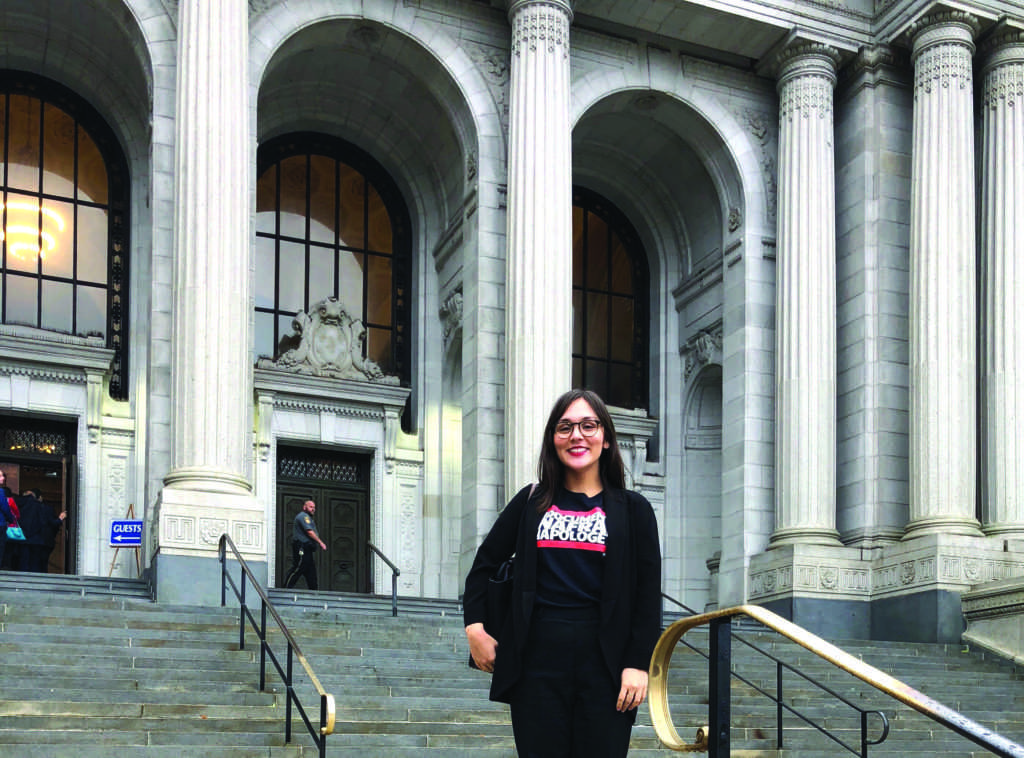Photo courtesy of Denia Perez./Courtesy to Golden Gate Xpress
After becoming the first Deferred Action for Childhood Arrivals recipient to pass the Connecticut bar exam, Denia Perez has shown how hard work and persistence pays off regardless of residency status.
Perez is an SF State alumna who graduated in 2012, the same year that DACA was passed. She went on to Quinnipiac University in Hamden, Connecticut, and graduated in May 2018.
When Perez was faced with legal difficulties in participating in the bar exam after graduating, she worked with one of her professors to propose new language to change the Connecticut practice book.
After a long legal process, the new amendment was adopted in July 2018. The new amendment in Section 2-8 of the practice book adds that any student who works lawfully in the U.S. may apply for admission to the bar exam.
Perez took the bar exam and became the first DACA recipient to pass the Connecticut bar exam in September 2018.
As a DACA recipient, Perez’ familiarity with immigration has caused her to pursue a career in immigration law.
Perez knew she would pursue law since she was in high school. She and her family immigrated from Mexico to the U.S. when she was 11 months old. Perez grew up in Santa Rosa, where she realized at a young age that she was one of the few kids of color in her classes. She said that her identity caused her to feel isolated even though she had many friends.
“I was basically the only person of color, if not one of very few. The others tended to be Asian,” Perez said. “I was definitely one of the only Latinx, so that was really hard to sort of feel like I had to prove all these stereotypes about Mexicans wrong.”
Perez attended Mills College and Santa Rosa Junior College before entering SF State to study women and gender studies.
Perez said that her studies opened her eyes to real-world systemic issues that she wished to tackle with her future in law.
“I was really blown away by all the stuff I was learning,” Perez said. “It was the first time someone had introduced the idea of patriarchy and intersectionality and has sort of opened my eyes to all these systemic problems that have existed for a long time but that don’t often get talked about.”
Julietta Hua, Perez’ SF State advisor, said Perez was always on top of her work and on track to graduate. Hua continues to be in awe of Perez’ drive and strength.
Hua believes Perez will serve as a great lawyer because of her experience with law.
“People who are part of DACA bring a distinct experience with the law to the study of the law, which I think is invaluable,” Hua said. “If you are making laws about access to citizenship and you want the law to work for and reflect ‘the people,’ then when it comes to citizenship and documentation, one of your biggest stakeholders should be the people who have struggled with access to citizenship.”
Perez’ closest friend from law school, Mandy Smallhorn, said her peers rallied around Perez in her time in law school and in lobbying for her ability to take the bar exam.
Smallhorn acknowledges the big feat Perez made in amending the law to make the bar exam available to DACA students.
“It’s a barrier that I’m not personally familiar with so I didn’t realize how far reaching it was, so when she started working on amending the law to make sure that it was crystal clear that someone with her status could still apply, it was like a no-brainer,” Smallhorn said.
Smallhorn admires Perez’ ability to speak out and use her identity to her advantage in law.
“She never sways from what she believes in, even if it’s unpopular or something that isn’t what the rest of the room feels,” she said. “She’s just her genuine, authentic self.”
Perez is currently doing a two-year fellowship of removal defense as an immigration attorney in New York. She hopes to help immigrants like her with her work, while simultaneously inspiring the DACA community to be unafraid to pursue law like she did.
Perez plans to continue inspiring her community while providing them opportunity to take the bar exam with her recently implemented legal amendment.
“I think I really wanted to do this so that I could help open up doors for other people like me,” she said. “For me, it was just a great way to give back and help others like myself.”
An earlier version of this story incorrectly quoted Perez saying “Latin mix” instead of “Latinx.” Xpress regrets this error.











